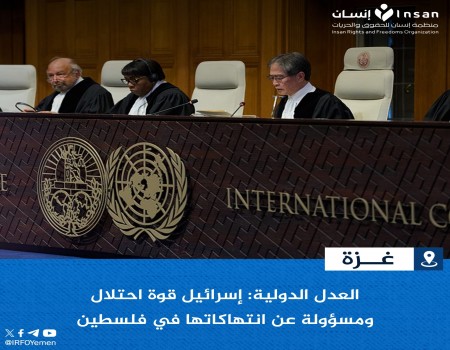The International Court of Justice (ICJ) has declared that Israel bears full legal responsibility as an occupying power and must immediately cease its violations in the Palestinian territories.
In a unanimous ruling issued in The Hague, the ICJ affirmed that Israel carries complete legal responsibility as an occupying authority and must immediately stop applying its domestic laws within the occupied Palestinian territories.
The Court stated that Israel is obligated to refrain from imposing its legislation or civil administration on the occupied territories, considering such actions a clear violation of international law and United Nations resolutions, which emphasize the illegality of any measures that alter the legal status of those territories.
The ICJ stressed that the State of Israel, as an occupying power, is required to fulfill all its legal obligations toward the Palestinian population, including ensuring the protection of their human rights and providing their basic needs—food, water, medicine, and shelter.
In a remarkable statement, the Court unanimously reaffirmed the prohibition on using starvation as a method of warfare, noting that Israel’s practices in the Gaza Strip constitute a blatant violation of this fundamental humanitarian principle enshrined in the Geneva Conventions and international humanitarian law.
The Court also called on Israel to facilitate all humanitarian relief operations for civilians in the occupied territories and to fully cooperate with the United Nations and international humanitarian organizations, particularly UNRWA, to ensure aid reaches those in need without obstruction.
The Court confirmed that Israel has not yet ensured that the residents of the Gaza Strip receive essential supplies necessary for survival, making it responsible for breaching its international obligations toward civilians during armed conflict.
Furthermore, the Court stated that Israel must allow the International Committee of the Red Cross to visit all detainees held in the occupied Palestinian territories and guarantee their treatment in accordance with international standards, emphasizing that denying visits or concealing detainees’ fates constitutes a grave breach of the Fourth Geneva Convention.
In conclusion, the ICJ stressed that Israel must cooperate in good faith with the United Nations and its agencies, and provide full support to humanitarian organizations operating in the Palestinian territories, in line with its legal obligations as an occupying power. The Court warned that continued violations could lead to broader international accountability and future legal actions against Israeli officials.
This historic ruling by the International Court of Justice reinforces legal accountability and places the international community before its responsibilities to ensure the protection of Palestinian civilians and support humanitarian institutions operating on the ground.




